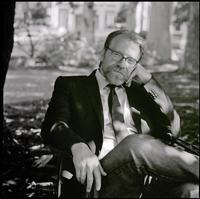George Saunders, a MacArthur Genius and one of TIME magazine’s 100 most influential people, is the author of several collections of short stories, including the New York Times notable books Pastoralia and CivilWarLand in Bad Decline, Story Prize finalist In Persuasion Nation, and National Book Award finalist Tenth of December. Known for his surreal, darkly funny fiction, Saunders tells "just the kinds of stories we need to get us through these times," according to novelist Thomas Pynchon. Saunders’s latest work—and his first novel—is Lincoln in the Bardo, a tale of the 16th president’s son’s death and his bizarre purgatorial afterlife. The writer Zadie Smith calls it "a masterpiece."
What role have libraries played in your life? What role do you think they play in our 21st-Century world?
This may sound a little dramatic but my writing trajectory changed forever in the Chicago Public Library. I was trying to figure out what contemporary fiction was all about and at that
time a library was the one place you could find literary journals. In one of these (Antaeus) I found "Hot Ice" by Stuart Dybek and that was it for me—I knew contemporary fiction could be a vital, moral force in the world. And that’s what libraries will always do: be a place where the world’s great knowledge is physically stored, and where serendipity is possible.
Lincoln in the Bardo is your first novel. What compelled you to write a novel at this point in your successful career? How did the process of writing it compare to writing short stories, novellas, or narrative nonfiction?
It was really just this particular material, which turned out (it came to feel) required that form. I honestly had pretty much given up on writing a novel, was perfectly content with that … and then this material arrived. Or, I should say, it became undeniably urgent, after hanging around in my head for about 20 years. As far as the process, it wasn’t really all that different—like a car mechanic suddenly starting to work on an airplane engine. Wait, I guess that is pretty different… . But in this case, the approach really was very similar and had to do with doing lots of revising. The one nice thing was, I had really strong opinions about the book—could tell if a new bit was working or not.
Lincoln in the Bardo is, at is core, a ghost story. Have you had any encounters with ghosts? If not, which literary or historical ghosts would you be keen to interact with and why?
I’ve had one, but I think I’ll keep that to myself. I wouldn’t mind meeting Gogol’s ghost, so I could ask for some writing tips. Well, Gogol’s ghost and the ghost of a Russian translator.
Your prose is characterized by colloquial phrases, humor, and absurdism—even when the tone is generally melancholy. What draws you to this language?
Flannery O’Connor said something like, "A man can choose what he writes but he can’t choose what he makes live." I think that’s why I gravitate to that kind of language—I feel I can get some heat going with it. That’s how writing works, I think: First we do what we can make live, and then we find philosophical or thematic rationales afterward. It doesn’t mean these aren’t valid—it just means they aren’t causative. That’s been my experience anyway.
To you, the Free Library of Philadelphia is also the Free Library of ____. Why?
It is also the Free Library of Providing Such Means Necessary to Expand the Souls of Those Who Enter Therein. Why? Because all (well, much) of human knowledge is in there, organized and tended by loving hosts. The only limits are the curiosity and energy of the seeker.
Listen to George Saunders's recent reading at Parkway Central Library!
This story was originally featured in our Spring 2017 issue of Off the Shelf, a biannual publication with news and features from across the Free Library of Philadelphia system.
Have a question for Free Library staff? Please submit it to our Ask a Librarian page and receive a response within two business days.

